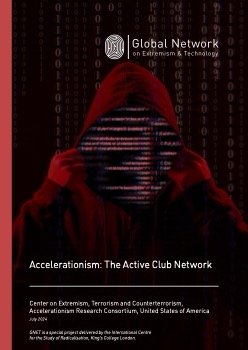Accelerationism: The Active Club Network
By Center on Extremism, Terrorism and Counterterrorism, Accelerationism Research Consortium, United States of America
This report is the fourth in a series of short reports that look at the user journeys of individuals in extremist communities. This report focuses on the Active Club Network (ACN), which is a decentralised and transnational neofascist accelerationism sub‑community within the broader accelerationist movement. The accelerationist element is particularly noteworthy. This sub‑community consists of small, individually informed organisations that emphasise White fraternal brotherhood, Evolian traditionalism, and preparation for war against a perceived White genocide. The focus on the ACN is due to its presence across several social media platforms, maintaining accounts on both mainstream and alternative platforms. The focus is also partly because the user journey of its members and adherents is mostly characterised by a more robust multi‑platform experience. The study used focused groups which mainly comprised individuals who have accessed, observed and occasionally participated in the private communication channels of these accelerationist movements. The names of all communities mentioned during the focus group, including those that participants accessed, have been removed. The report highlights platform use, violence, attacks and gender dynamics. Key findings on accelerationism are: • For some of these groups such as ACN – the focus of this report – user journey is mostly characterised by a robust multi‑platform experience, in which affiliated accounts across various accounts link with each other in order to give their content maximum visibility. • Online platforms used by ACN include Instagram, Facebook, X (formerly Twitter) and YouTube. Telegram remains a central hub where Active Club members and its adherents can gather, share propaganda and coordinate among themselves. • Active Clubs intentionally eschew overtly violent tactics and activities mainly to avoid drawing the attention of law enforcement. • Within these Clubs, women are rarely spoken of, while men are expected to adhere to traditional roles as leaders and physical protectors of their families.
London: Global Network on Extremism and Technology (GNET), 2024, 20p.


